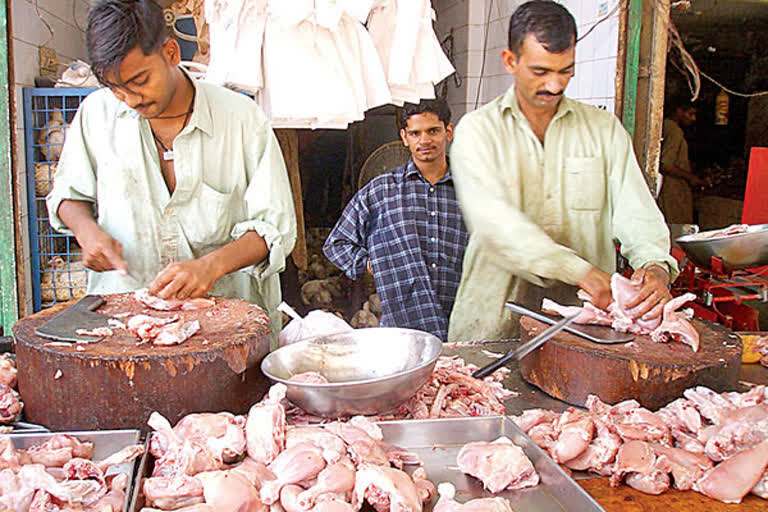Hyderabad (Telangana): Ask any of the local butcher shops if the chicken, mutton or any meat they sell underwent a health checkup. The answer will be anything except a yes or no. That is because nobody knows that there is such a rule. Or instead, the FSSAI officials never clarified to them, the Slaughter-House Rules.
Each veterinarian can perform health checks for 96 buffaloes or bulls, 200 goats or sheep and 1000 chickens during his 8-hour duty. The Agricultural and Processed Food Products Export Development Authority (APEDA) has issued guidelines that meat can be processed for export only after a certified veterinarian issues a fitness certificate to the animal. However, this rule is not being implemented in any of the meat shops across India.
Meat lovers in the country eagerly wait for Sunday. For that is the day they can relish their favourite chicken or mutton dishes. The Department of Animal Husbandry estimated that 70 per cent of Indians over 15 prefer non-vegetarian food while the percentage is 85 in Telangana. But, is the meat they buy of good quality? That is doubtful, declared the National Research Centre on Meat (NRCM). The Centre in its study concluded that no thorough checks are conducted before slaughtering. Only large slaughterhouses follow the procedure of health checkups and quality certificate to ensure hassle-free exports. Nobody in India is aware of these rules. In fact, there is a shortage of veterinarians who can issue health certificates to animals. The policy paper of the joint study by NRCM and the National Academy of Agricultural Research Management (NAARM) was sent to the central government. Since it is difficult to recruit enough veterinary personnel for animal inspections, the study suggested creating the post of meat inspector and provide them scientific training. The study also includes data of meat consumption and sales. Eenadu collated excerpts from the study.
READ: Eating Processed Meat Linked To Dementia Risk
1.60 crore animals slaughtered a day
Nationwide, in 2018 alone, 271 crore animals were butchered for meat. The number includes 254.42 crore chickens, 4.62 crore sheep and 9.39 crore goats. That means, on average, 93.47 lakh animals were slaughtered every day. Just to check the quality of these animals, 13,314 veterinarians have to work 8 hours a day. While nothing of that sort happened, meat consumption increases by 20 per cent every year. Going by this estimate, 60 lakh crore animals would be butchered this year.
Profits to the tune of 6 lakh crore
In 2014, Indians consumed meat worth Rs 2 lakh crore. In 2021, the number would go up to 6 lakh crore. Between Rs 400 and 500 per kg, mutton is the most expensive meat. The price is Rs 700 per kg in Hyderabad though. The rate of chicken has gone up to Rs 270.
Shortage of veterinarians
India is short of 36,950 vets and 2.07 lakh veterinary support staff as per the 12th five-year plan. At present, the number of veterinary graduates per year in the country is 63,000. According to the Veterinary Council of India, 1.2 lakh graduates a year would meet the actual demand.
90 per cent retail sales
As per the National Sample Survey 2014, 71 per cent of people over 15 are non-vegetarians. 90 per cent of the population buys meat through the unorganized sector. All food items were once sold in retail. They are now being packed and branded for online sales. However, the majority of people avoid buying packaged meat online. They prefer going to the local butcher for fresh meat. Over the past 4 years, several start-ups tried to increase online meat sales. Since the rural populace shied away from digital butchers, the companies narrowed their focus to urban areas.



